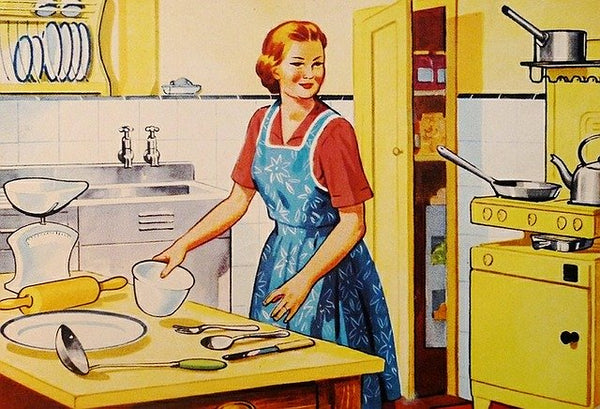Meditation in a Dustpan

(A chapter from Women, Words, and Wisdom)
My husband says I shouldn’t write so much about dirt. (He’s a man.) Actually, dirt isn’t just a penance. It’s a higher education. Dirt is to a housekeeper what heresy is to the Church. It’s something to beat against, learn from, and grow strong on. I’ve learned more from just looking at dirt than any man could possibly imagine.
I suspect I’m not alone in this, but you can’t get many people to admit it. One shining exception was a housewife like myself who lived next door to me back in the early days of my marriage when we lived in suburbia. During the coffee break one morning, with our babies stashed dry in the playpen, she invited me to speculate with her, in a scientific spirit, on the precise point at which good food (which may have required hours of artistic preparation) became GARBAGE. There ensued something like the following:
“Does it happen the minute your husband positively refuses to eat it?”
“No, I guess it’s when you get up from the table and leave it to itself on the plate.”
“Suppose you went back and finished it later? Would you be eating garbage?”
“Then I guess it’s when it’s scraped together with all the other leftovers.”
“Is it being mixed up that does it? What about tossed salads? They’re mixed up, but not garbage.”
“Maybe when you set it out for the dog?”
“Who would ever admit feeding his dog garbage! You call that scraps!”
“But is it really garbage?”
“Well, it’s certainly garbage when you put it in the garbage can!”
“What would you be putting it in the garbage can for if it wasn’t already garbage?”
“What is garbage? Seems to me we have to settle the definition first, before we can even begin to talk about it.”
We never solved the problem. I guess trouble in the playpen prevented it. I for one couldn’t have solved it anyway, because I didn’t believe in God at the time. As St. Anselm put it, “Credo ut intelligam:” You have to have the faith before you can reason anything out all the way.
Nevertheless, I offer this conversation as proof positive that speculative thinking on the philosophical level does go on in suburbs. It’s hidden, but there.
Practical repercussions in this case were negligible, unless it contributed in some mysterious way to one of our family’s most solid traditions: my weekly soupe garbage, pronounced garbahge in deference to my French blood and the inevitable onion. Into this culinary triumph all unmanageable leftovers disappear to be transformed into something rich and strange, more or less delicious, as the ingredients would have it.
I mention it because it’s the only instance I can cite offhand where garbage (in its broadest sense, of course) can be said to become good food again (also in its broadest sense). Though it’s never theoretically impossible, it’s rather like unboiling the egg. To me my soupe has become a symbol of Redemption. The family can’t always see it that way, but I derive much consolation from the thought as I watch it bubble on the stove.
I hadn’t thought about the old garbage discussion for years until the other day. I was sweeping the kitchen floor and had just cajoled all the sweepings into the dustpan. For some reason I was drawn to examine them very carefully.
This isn’t recommended behavior. If any friend had come in at the moment and found me squatting chin in hand a few inches above the floor, peering into my dustpan for almost a quarter of an hour, I suppose my husband would have caught it for making me live so long “isolated out there in the middle of the country.”
What I saw was positively fascinating. Crumpled eggshells. Lots of red brick dust from the brick floor. The bricks used to be the second storey of the old North Fork Baptist Church out our way. When the roof blew off the third time some years back, the congregation decided to face facts and bring the building down to just one level. We bought the surplus bricks for a penny apiece and laid them out in the kitchen. This allows me to trample heresy as I prepare dinner.
But, to continue: Well-covered with brick dust was an old dry tomato skin. Then a greasy marble. Several corn flakes. Lint from the dryer. Two crumpled paper napkins. A crust of toast with jelly (wineberry, from our own bushes) on it. Several pieces of broken glass. A rubber band and, as they say in the ads for country auctions, “other articles too numerous to mention.” (Oh, yes, I sweep every day.)
Looked at dispassionately, each of these items was in itself quite unobjectionable ―a “good” as scholastic philosophy would put it. An eggshell is an eggshell. No one, surely, will dispute that. On the egg it’s especially proper, useful, a perfect ceramic and one of God’s minor masterpieces. Who can find brick dust unworthy, especially in bricks, or back in its native clay? Or in the Baptist Church? (I’m not indifferent, just tolerant.) A tomato skin on a tomato is beautiful. A marble is a marble, a miracle of the glassmaker’s art. The grease on it, back in the grease can or the hog, is dandy.
So mentally putting the corn flakes back in their box, the lint back on the clothes and the rubber band all the way to the rubber plantation, I couldn’t find any dirt. Then what was it that made this mixture of good things so revolting? Even the invisible germs were perfectly good in their place.
That was when I remembered the garbage conversation. It must have been perseverating for fully fifteen years. So that was what St. Thomas Aquinas meant when he postulated evil has no real existence! That all things in themselves are essentially good. No wonder we couldn’t find out what makes garbage garbage. We were trying to solve what St. Paul was content to call “the mystery of iniquity.”
Evil exists only because good exists. If good disappeared, evil would disappear, because evil is simply a principle of disorder ―a perversion of God’s perfect creatures from their proper uses and ends. No wonder after I got through imagining all the contents of the dustpan into their proper places the “dirt” was gone and the dustpan empty. What’s more my sweeping, oh joy, had become needless.
"Evil exists only because good exists. If good disappeared, evil would disappear, because evil is simply a principle of disorder ―a perversion of God’s perfect creatures"
When I finished applying the same technique to the activities and passions of mankind, avarice had turned back into justice and economy, love of self into love of God, anger into zeal, lies were straightened out into truth, and lust into the service of creation. Hell was turned into Heaven. Jails, insane asylums, hospitals, battleships and brothels were as empty as my dustpan. The world was as God meant it to be.
Maybe you’ve always known this. I haven’t. Oh, I guess I knew it intellectually, but I never really knew it and possessed it until I saw it in the dustpan. All the sins of the world are there.
As I said, there’s a lot to be learned from just looking at dirt and sweeping it up. And how a housewife hopes to get by without Thomistic philosophy, I can’t imagine.
This excerpt is taken from Solange Hertz's book, Women, Words & Wisdom.






